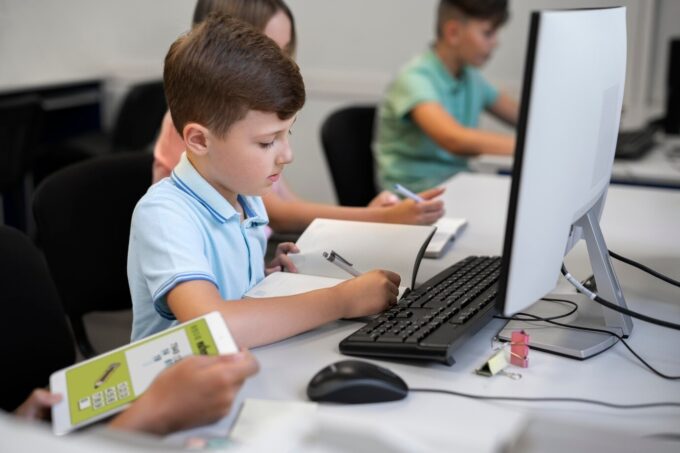Computer literacy has transitioned from being considered a luxury to an essential skill in today’s digital age. With technology becoming increasingly intertwined with various aspects of our lives, ranging from education through online learning platforms to employment opportunities via remote work setups, the ability to navigate and utilize digital tools has become paramount.
As society progresses towards a more technologically driven future, individuals who possess strong computer literacy skills gain a competitive edge in both academic and professional spheres. This proficiency not only enhances productivity and efficiency but also opens doors to a myriad of opportunities in the evolving digital landscape. Recognizing this, many parents are now turning to computer courses for kids to unlock their child’s potential.
Computer courses allow children to develop essential skills that will be invaluable. These courses introduce them to coding, programming, and problem-solving basics.
Benefits of Computer Courses for Kids

Source: freepik.com
Computer courses offer these benefits for children:
- Promotes Creativity: When it comes to creativity and graphic design, computers are limitless. Children may learn how to make animations, images, films, and webpages using a variety of software tools.
- Enhances Reasoning Ability: Children who study programming languages are better able to comprehend logical ideas. Children who comprehend these ideas can resolve challenging issues.
- Boosts confidence: Children gain self-confidence and competence as they learn new skills. Using computer applications to finish difficult assignments creates a sense of satisfaction.
- Promotes Cooperation: Group projects, where students work together, are a common feature of computer courses. Youngsters learn important collaboration and teamwork skills when they work together.
Common Computer Courses for Kids

Source: blog.internxt.com
A wide range of computer courses are available for kids, each catering to different interests and skill levels. Here are the common computer courses:
Introduction to Coding
This course introduces children to the basics of coding using visual programming languages. They learn to create animations, games, and interactive stories. This is while building a strong foundation in programming concepts.
Web Development
In this course, kids learn the fundamentals of web development. This includes HTML, CSS, and JavaScript. They create their own websites. Plus, they learn how to design web pages and make them interactive.
Robotics

Source: freepik.com
Robotics courses combine programming and engineering skills. Children learn to build and program robots.
Additionally, they explore concepts like sensors, motors, and artificial intelligence. This hands-on approach sparks creativity and problem-solving abilities.
App Development
This course focuses on mobile app development to teach children how to create their own apps. They learn programming languages and gain practical experience in developing user-friendly applications.
How to Choose the Right Computer Course

Source: mycourseguru.in
Choosing the right computer course for your kid is important to ensure a better learning experience. Here are tips to help you select the perfect fit:
- Assess Interests and Abilities: Begin by understanding your child’s interests, strengths, and weaknesses. Are they interested in gaming, art, or building things? Do they enjoy solving puzzles or working with numbers? Identifying their passions and aptitudes will guide you toward a suitable computer course.
- Age Appropriateness: Consider your child’s age and maturity level when choosing a course. Some classes may be too advanced for younger children, while others might not challenge older ones. Make sure the content aligns with their current stage of development.
- Curriculum Coverage: Research the course syllabus thoroughly. Look for well-rounded curricula that cover topics. A comprehensive program provides a solid foundation for further study and growth.
- Hands-On Experience: Opt for courses offering plenty of hands-on activities and project-based learning experiences. Practical applications enable kids to apply theoretical concepts in real-life scenarios.
- Teaching Style: Different children respond differently to varying teaching methods. Some prefer visual demonstrations, while others benefit from verbal explanations. Seek courses taught by qualified educators skilled in many delivery techniques.
- Social Interaction Opportunities: Select courses that encourage peer-to-peer interaction. This enables children to share ideas, ask questions, and collaborate on projects. Group settings promote healthy competition, enhance social skills, and nurture long-term relationships.
- Feedback Mechanisms: Positive reinforcement plays a role in shaping young minds. Look for courses that incorporate constructive criticism, regular assessments, and open communication channels.
- Cost and Value: Compare prices and check what each course includes. You need to consider hourly rates, materials fees, and any more resources provided. Balance affordability with the value derived from high-quality instruction and engaging content.
Flexibility allows kids to learn at their own pace and explore topics of interest in more depth.
Tips for Success in Computer Courses for Kids

Source: kidskonnect.com
While computer courses offer benefits, success in these courses requires dedication and effort. Here are some tips to help your child excel in their computer course:
- Encourage Practice: Like any skill, computer programming requires practice. Encourage your child to spend regular time coding and experimenting with different projects. This consistent practice will improve their computer skills and boost their confidence.
- Promote Problem-Solving: Encourage your child to approach coding challenges as opportunities for problem-solving. Teach them to solve problems into manageable steps. This improves independence and computational thinking skills.
- Provide Support: Offer guidance and support when your child encounters difficulties or feels stuck. Help them brainstorm ideas, provide resources, or connect them with online communities. This support system will help them overcome obstacles and stay motivated.
Parting Thoughts
Investing in computer science courses for kids is an investment in their future. These courses equip children with valuable skills and ignite their passion. With the right guidance and opportunities, children can harness their inner tech genius.



